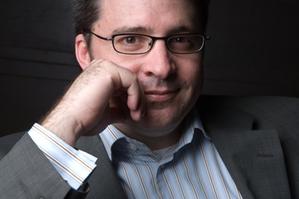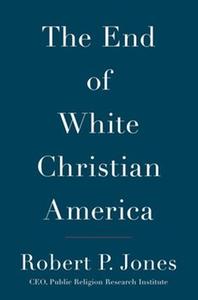
|
|
| photo: Randy Bacon | |
As CEO of the Public Religion Research Institute, a nonprofit, nonpartisan organization that tracks public opinion, Robert P. Jones is a leading thinker at the intersection of religion, politics and culture. His new book, The End of White Christian America (Simon & Schuster), is a thought-provoking look at the declining role of religion in American culture after 240 years at the core of this country's self-identity as a majority Christian nation. Jones says that understanding how and why traditional religion lost its influence is essential if we are to understand today's divisive political and cultural conflicts and reckon with the profound and far-reaching consequences that will affect all our cultural touchstones, from defining marriage to deciding who can immigrate. Here, Jones discusses some of the issues he takes on more fully in The End of White Christian America. Our review is below.
Donald Trump aside, the Republican party's identification with evangelical Christianity shows little sign of letting up. Yet, as you point out, white Christians are now a minority and continuing to decline. Can you explain why this segment continues to dominate politics and RNC policy positions?
The decline of white Protestants over the last three decades--including declines among white evangelical Protestants in the most recent decade--has gone hand in hand with transformations in our two major political parties. Following the 1965 Civil Rights Act especially, when the Democratic Party became identified with the cause of equal rights for African Americans, conservative white Christians, particularly in the South, began to shift toward the Republican Party as part of what political scientists have called "the great white switch." Over the last few election cycles, nearly eight in 10 white evangelical Protestants have voted for Republican presidential candidates, and white evangelicals make up as many as three-quarters of Republican primary voters in many Southern states. So, despite the fact that white evangelical Protestants have been declining as a proportion of the population, because they have been so active within a single political party, they have been able to retain influence even as their numbers decline. Notably, however, with white evangelicals abandoning fellow evangelical candidates such as Mike Huckabee and Ted Cruz, we may be seeing the lines of influence reversing--with conservative Christians' allegiance to the Republican Party, rather than the party's allegiance to conservative Christians--playing the dominant role.
Why are Catholics not included in your definition of "white Christian America" even though they and Protestants, both mainline and evangelical, are in alignment on many issues?
Today, it's easy to forget that the first half of the 20th century was marked by significant anti-Catholic sentiment, and that even as late as 1960, President John F. Kennedy faced significant opposition because of his Catholic faith. The major institutions that characterized "white Christian America" at the height of its mid-20th-century power, such as the National Council of Churches, were very intentionally Protestant. In fact, many saw the major threats to American culture to be Catholicism, Communism, and secularism. It wasn't until the Christian Right political movement began to wane in the 1990s that the door was opened to Catholic cooperation on political issues.
Many journalists and pundits argue that current global social and economic forces have marginalized men, particularly working-class white men. And white men--Franklin Graham, James Dobson, Russell Moore--tend to set the terms for the discussing the place of conservative Protestant Christianity. Is there a connection?
White working-class Americans were hit hard in the recession, and many have also experienced cultural changes that have left them with a sense of vertigo. Despite the fact that economists tell us the recession has ended, seven in 10 Americans still believe we are in a recession. And the changing demographics of the country, combined with liberalization of views of prominent issues like same-sex marriage, have left many white working-class Americans with a sense that the country has moved on, leaving them behind. The end of white Christian America, for these folks, means the end of a stable cultural world in which they felt at home. In public opinion data, you can see these feelings play out in questions around nostalgia for the 1950s, racial resentment and concerns about so-called "reverse discrimination," and pessimism about the future. These sentiments are most pronounced among white working-class men, who are also wrestling with shifting attitudes about traditional gender roles, but they are also present among white working-class women. You argue that millennials are driving the shift to more liberal attitudes about hot-button issues like same-sex marriage, gay and lesbian rights, immigration and race. But many studies show that people tend to become more conservative and more religious as they age. How sticky do you think those more open attitudes are?
You argue that millennials are driving the shift to more liberal attitudes about hot-button issues like same-sex marriage, gay and lesbian rights, immigration and race. But many studies show that people tend to become more conservative and more religious as they age. How sticky do you think those more open attitudes are?
There is solid evidence that the attitudes on gay rights, immigration, race and religion will endure as the millennial generation ages. On the issues of gay rights, immigration and race, the most powerful predictor of attitudes is social connections. Millennials are much more likely than older generations to know someone who is gay, lesbian, transgender or bisexual. And for most millennials, the issue of gay rights is simply "common sense," not some thorny moral issue, as it has been for many older Americans. The millennial generation is also the most diverse generation the country has ever seen, and millennials are more likely than others to rub shoulders with immigrants or those of other races. On the issue of religion, millennials are the least religiously affiliated generation we've ever seen, even when we compare this generation to previous generations in their 20s. Even if some millennials affiliate with a religious group as they age, they will still remain the least religiously affiliated generation. Moreover, we also have good evidence that religiously unaffiliated millennials are seeking out other religiously unaffiliated millennials as marriage partners, and these couples will be even less likely to seek out religious affiliation.
Donald Trump's election campaign has been widely criticized for exploiting fear of the "other"--anyone who is different from the stereotype of traditional Christian America. You note that white Christian voters will constitute less than a majority of the electorate by 2024, and whites overall will become an ethnic minority by 2042. How would you like to see our leaders talk more positively about the challenges inherent in these demographic shifts?
In the book, I make the case that Mitt Romney's 2012 campaign was the last campaign that could plausibly hope to pile up enough white Christian votes to win a national presidential election. In a post-election assessment report that came to be known as "the autopsy report," the Republican Party came to essentially the same conclusion--that they had to broaden their electoral base beyond white voters to win national elections. Donald Trump's campaign, with its strong anti-immigrant strains, appears to be steering Republicans toward a test of that theory. While I think this is likely to be a long-term disaster for the Republican Party, I also believe that it is not good for our democracy to have one political party essentially representing anxious and aging conservative white Christians and one political party representing most everyone else.
You start with an irresistible hook--an obituary for white Christian America, and close with a eulogy. Why did you choose to frame your book this way?
In the final chapter of the book, I wanted to offer some reflections aimed both at those who are mourning the loss of white Christian America and for those who might be dancing on the grave. Among those descendants of white Christian America who are grieving its loss, we are seeing various reactions that correspond well to Kübler-Ross's stages of grief--denial, anger, depression and acceptance. Ultimately, the realities demand that white Christians find some path toward acceptance, and I hope the book makes some contribution toward that end.
For those who are inclined to celebrate white Christian America's demise, I argue that they should at least acknowledge the significant contributions this world made to American history and culture, and that any healthy American future must also include a place for this large group that nonetheless finds itself now in the minority. --Jeanette Zwart, freelance writer and reviewer

